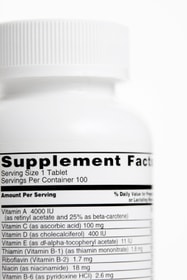
It?s very hard to get the nutrition we need through our food. There are several reasons for this:
Soil exhaustion prevents plants from getting enough nutrition.
The beef, poultry and fish we eat are fed with food they?re not made to eat; for instance, cows are fed corn instead of grass. This leads to less healthy animals, and less healthy food from those animals.
Food animals are kept in conditions they?re not supposed to be in. For example, pigs are kept in crates instead of allowed to graze.
It seems to make sense that taking vitamins would help supplement what we?re missing from our food, doesn?t it? Not necessarily. Multiple reports from mainstream medicine have not proved the benefits of taking vitamins or other supplements except in a few conditions:
Folic acid during pregnancy
Vitamin D for rickets
Vitamin B1 for alcohol related encephalopathy
Vitamin C for scurvy
What works, what doesn?t
Even the benefits of omega 3 fatty acids are under attack now, because of a recent study from Greece that concluded that there is no reduction in heart attacks, stroke or death in patients taking fish oil supplements (1). Another study concluded that there are no health benefits of eating organic food articles (2).
On the other hand, we know from a 1970 article published in the medical journal Lancet, that Eskimo have almost no heart attacks because of the omega 3 fatty acids from fish they eat. This strongly suggests that fish oil may prevent heart disease. So how can we put these two facts that seem to contradict each other, together?
The key to understanding what is going on may be in the analysis what is working and what is not.
Let?s look at what the vitamins that do work, according to mainstream medicine: folic acid, vitamin C and B vitamins. What do the have in common? They are water-soluble. This means your body can absorb them relatively easily.
What isn?t working: vitamin E, vitamin D for cancer (but it works for rickets), and omega 3 fatty acids. What do they have in common? They are fat-soluble. This means your body needs to employ a lot of mechanisms to absorb them, from bile secretions to pancreatic enzymes. So these vitamins are not as easily absorbed as water-soluble vitamins.
But why do some vitamins work some of the time?such as vitamin D for rickets, and omega 3 for the Eskimo population? The fact that fat-soluble vitamin D works for rickets can be explained by assuming that kids with rickets usually have relatively healthy digestive system in comparison with adults. (Rickets are more prevalent in children than adults.)
Another plausible explanation is: supplements, including fish oil, are processed substances. The natural alternative is real foods. In the study from Greece that showed no benefits, patients were taking fish oil in capsules, not raw fish oil, that is unprocessed. Eskimo get their fish oil from fish, not capsules.
Don?t just pop pills
Getting the right vitamins isn?t just a simple matter of popping a multi-vitamin. What you need depends on how your body is absorbing and digesting nutrients.
There are several things you need to check before you can determine what vitamins you need daily.
You need to check your hydrochloric acid production.
Do you have enough digestive enzymes?
Do you have enough beneficial bacteria on your gut?
Are there any parasites or bad bacteria in your gut?
My suggestions
Don?t take any vitamins or supplements unless they are recommended by a doctor.
Stick with a Paleolithic diet.
Consult your doctor to find out if your digestive system is healthy enough to digest foods and supplements properly.
Talk to your doctor about which vitamins and supplements you need.
References:
http://www.reuters.com/article/2012/09/03/us-organic-food-idUSBRE8820M920120903

